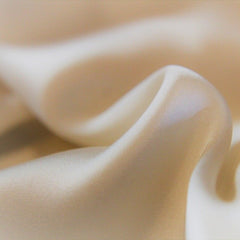VISCOSE
 Isn't Viscose a synthetic fabric?
Isn't Viscose a synthetic fabric?Viscose is one of the most confusing fabrics to understand as the manufacturing process actually involves natural compounds.
Viscose is often known as Rayon, and was originally known as 'artificial silk' due to its silk-like qualities.
The "Viscose Process" is the dissolving of wood pulp to a natural cellulose solution. However, it then requires extensive processing to become a fibre. So Viscose isn't a natural fibre per se: it's plant based but requires synthetic processing.
But the 100% cellulose fibre means it's natural, so therefore sustainable?
Confusion ensues! As it is made from a natural renewable source, it is biodegradable. The dissolving of wood pulp must first come from sustainable wood resources. A lot of manufacturing processes don't state where the wood is from (which could lead to issues such as deforestation) although there are now more certification practices in place to verify this.
Confusion ensues! As it is made from a natural renewable source, it is biodegradable. The dissolving of wood pulp must first come from sustainable wood resources. A lot of manufacturing processes don't state where the wood is from (which could lead to issues such as deforestation) although there are now more certification practices in place to verify this.
Moving onto the processing to make it a regenerated cellulose fibre, a lot of chemicals are required to treat it, which can lead to untreated wastewater being dumped into our waterways. You may have heard of Lyocell or Modal. These are another 2 types of fabrics derived from cellulose. They use different chemicals in the treating of the fibre to produce different properties to Viscose. These chemicals are known to be less harsh, and operate on a closed-loop system (chemicals are recycled, minimising harmful waste); therefore being more environmentally friendly, though they require more power to process.
As technology advances, there are more attempts to make the Viscose processing more environmentally friendly. The brand Atelier Brunette produces woven rayon viscose using certified fibres, meeting two essential criteria: the use of sustainable wood resources and the implementation of sustainable production processes certified by independent organisations (Higg Index, EU Eco label). This process generates up to 50% lower emissions and water impact than generic Viscose. [1.]
Is it recyclable?
As a 100% cellulose fibre, it can be reused and remanufactured into regenerated cellulose fibres. However it may not be able to be reused if it has been blended with other fibres.
References:
1. https://www.ecovero.com
